Roxine Helberg’s feature debut ‘Cold Copy,’ probes into the ugly heart of media culture and how the propensity to obfuscate the truth triumphs over telling it how it is. The thriller centers on a young journalism student, Mia Scott, whose tutelage under famous reporter and TV host Diane Heger results in a desperate race to impress. Tasked with hunting down a sensational piece of news by Diane, Mia descends into a state of fixation at the prospect of finding the perfect story. Though it doesn’t exist, Mia doesn’t stop her journalistic pursuit, no matter what the cost.
Like peeling back the layers of an onion, ‘Cold Copy’ rips the skin off of a media industry obsessed with news cycles, sensationalized stories, and grabbing eyeballs. Mia’s drive for perfection in a murky, messy, unfiltered world of conflicting reports portrays the moral vacuity of her mentor, Diane, who encourages her student to get ahead any way she can. The story of ‘Cold Copy’ reflects the contemporary world’s clickbait-focused, attention-centered media networks in all their nastiness. So, did Roxine Helberg root the film in real events?
Cold Copy Explores How Often the Truth is Manipulated
Although fictional in its account, ‘Cold Copy’ appears to be inspired by the dark stories circulating the news at all times. For Roxine Helberg, who both wrote and directed the journalistic thriller, the subject matter came naturally. Before becoming a filmmaker after a foray into documentary filmmaking, she planned on becoming a journalist. As a result, the core thematic element of truth versus sensationalism was something she’d always found interesting. It illustrated to her how the media has been functioning in reality — propagating their version of the truth versus reporting how it might have happened.

In an interview with The Au Review, Helberg gave an insight into her thinking. “I think how this specific story came about was, maybe 10 years ago, I was noticing the pressure to present the perfect version of yourself,” she said. “Thanks to social media, we had to bend the image of ourselves. Attract more attention. Attract more likes. And what was really interesting to me was that there was a parallel with what was happening in journalism with the rise of clickbait, and those types of self-creating stories.”
Helberg pinpointed this race-to-the-bottom — when it comes to the way we interact with the news — to the emergence of an attention economy that was bleeding into the culture and disrupting communication channels. There are parallels to the writer-director’s words in Tracee Ellis Ross’ character of Diane. As the experienced reporter, she proselytizes her young inexperienced students to follow down a similar path to hers. However, the TV host at TNR is morally bankrupt and lacks any journalistic integrity, characteristics she would espouse to be a weakness when climbing to the top.
“I watched a lot of those dark-driven news shows where the news itself is sort of filtered through the perspective of the charisma of the presenter,” the writer-director said. “I think there’s something really unnerving about giving the news with a transformative face and mouth in that way, and I wanted to explore that unnerving angle in the character of Diane. That one-on-one dynamic where they simultaneously put a subject at ease and wrong-foot them and get them to open up, while challenging them. It’s like watching a sparring match.”
There are no positive examples to draw from when looking at the central characters. They have a warped view of what the truth entails, and when the truth isn’t available, it is engineered. Even Mia’s hunt for the ideal story to impress Diane is a desperate attempt at creating rather than reporting truthfully. The further Mia goes into her fanatical need to voyeuristically make up a sensational piece of news, the more she moves away from the realm of reality. As you watch her deteriorate, there is a sense of the cost of her deeds outweighing everything else.

On an Instagram post, Helberg said this. “We live in a time where truth has become a controversial term, where misinformation can spread a hundred times faster than any fact check or clarification can keep up. And we rightly hear lots of sweeping conversations about what that might do to democracy, about how it can demonize vulnerable groups, about how it threatens to destabilize society as we know it. No doubt we all worry about it. That instinct is what this film is about, the way our insecurities affect our relationship with the truth, and if that’s something you’ve grappled with even a little, then I hope this film will resonate with you, maybe even scare you a little.”
In many ways, ‘Cold Copy’ harkens back to another film of its kind — ‘Whiplash.’ The 2014 drama about a young music student’s single-minded efforts to become the best jazz drummer in the world is reminiscent of Helberg’s narrative, although hers is in a journalistic context. Like ‘Cold Copy,’ ‘Whiplash’ features a harsh teacher leading the protagonist who employs questionable tactics to impart his wisdom upon him. There are lots of parallels between Mia and Andrew, the jazz drummer. As their characters evolve over the course of the films, both display an ugliness hidden under the surface, laying bare how obsession spirals into a toxic need for success.
While writing the movie, Helberg envisaged an almost Frankenstein-like relationship between Mia and her teacher. Diane views Mia as a creation she can mold into her image. As both women are driven to achieve success no matter what, their only victory comes from the validation it brings. It’s a hollow one, but so is the story’s central premise. ‘Cold Copy’ exposes the emptiness pervading the media industry and the sharks at the top, like Diane, who purport to give it substance. Their pursuit of success may be valiant, but it’s a pyrrhic victory at best.
Read more: Best Movies About Politics on Netflix


You must be logged in to post a comment.